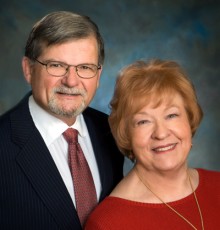 Drs. Kenneth and Rebecca Boren
Champion Mesa Community College’s Endowed Teaching Chair Program
Drs. Kenneth and Rebecca Boren
Champion Mesa Community College’s Endowed Teaching Chair Program
MESA, Ariz. – Local philanthropists Drs. Kenneth and Rebecca Boren have pledged $250,000 to the Endowed Teaching Chair program at Mesa Community College (MCC).
The Boren’s support enables the launch of a program established in 2009 to ensure MCC continues to attract and keep distinguished faculty members by offering opportunities to develop innovative modes of delivering educational content while improving overall student success.
“We believe that Mesa Community College offers an excellent education at a price that most people can afford. The value of the quality instruction at MCC is a benefit to the students who, on completion of their degrees, can advance to well-paid and satisfying jobs. That’s why we support the MCC endowment with our dollars. Lots of causes have value, but none more than the availability of a good education with excellent instructors,” said Rebecca Boren.
“The creativity and ingenuity of the Mesa Community College faculty and staff have always resulted in innovative approaches to improve student success; empowering them to succeed in the global market.” said Dr. Shouan Pan, President, Mesa Community College. “It is the support and trust of individuals like the Boren’s that has a multiplier effect in our community. An investment in instructional innovation and learning is key to changing the landscape of higher education and improving the overall success rates of our students.”
“The Endowed Teaching Chair program provides new opportunities to enhance and expand the range of knowledge and expertise of MCC’s faculty, exponentially expanding the educational experience of the community and students they serve,” Dr. Pan added.
The Endowed Teaching Chair program is part of the Maricopa Community Colleges campaign, Educating Our Community, Ensuring Our Future. “Endowed Teaching Chairs directly support faculty and staff innovation, creativity and excellence by funding development of new teaching methodologies to support student success,” Dr. Steve Helfgot, President and CEO, Maricopa Community Colleges Foundation. “The overall campaign also supports student scholarships and community partnerships with business and industry and K-12 schools.”
To get involved or to request additional information contact MCC’s Office of Development at 480-461-7200 or via e-mail at development@mesacc.edu. Individuals or groups may submit a pledge of any size to Mesa Community College online here (http://www.mesacc.edu/sites/default/files/pages/section/giving/GiftPledge-online.pdf)
# # #
Media Contacts
Dawn Zimmer, 480-461-7892, dawn.zimmer@mesacc.edu
Sally Mesarosh, 602-618-5730, sally.mesarosh@mesacc.edu
About Mesa Community College
Mesa Community College provides outstanding transfer and career and technical programs, workforce development, and life-long learning opportunities to residents of the East Valley area of Phoenix, Arizona. MCC excels in teaching, learning and empowering its more than 40,000 students who attend annually to succeed in a local and global community. Mesa Community College is one of ten colleges that comprise the Maricopa County Community College District. For additional information please visit mesacc.edu.
About Maricopa Community Colleges Foundation
The Maricopa Community Colleges Foundation is a 501 (c) (3) non-profit organization designated by the Maricopa County Community College District to receive and manage gifts on behalf of its ten colleges, two skill centers and multiple satellite centers. The Foundation actively seeks contributions from a variety of public and private sources including individuals, corporations and other foundations. It acts as a trustee for donations to assure that gifts are distributed in the manner specified by the donor. Learn more at mcccdf.org
The Maricopa County Community College District is an EEO/AA institution and an equal opportunity employer of protected veterans and individuals with disabilities.

